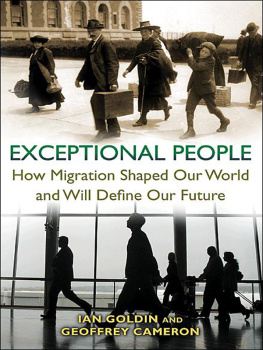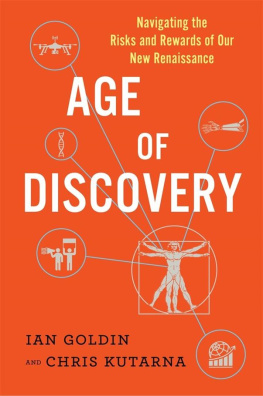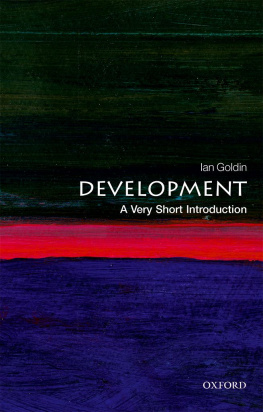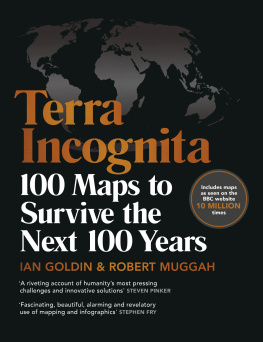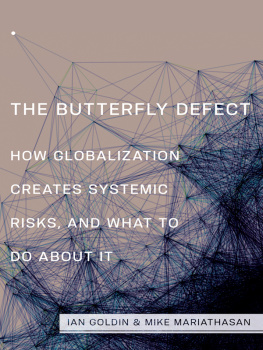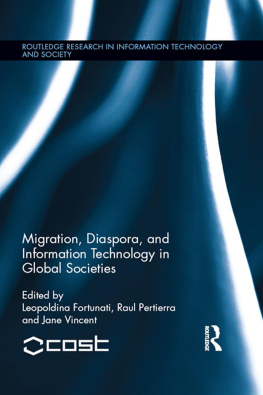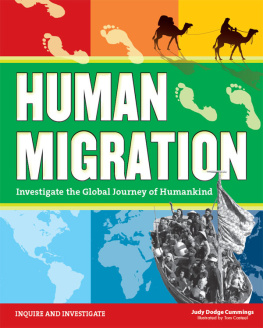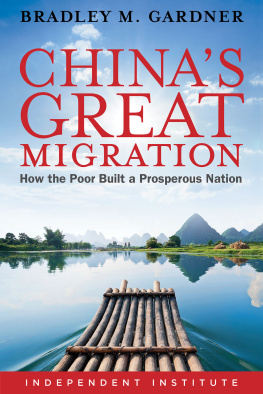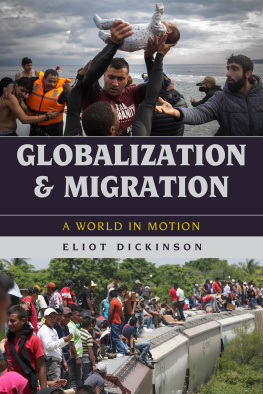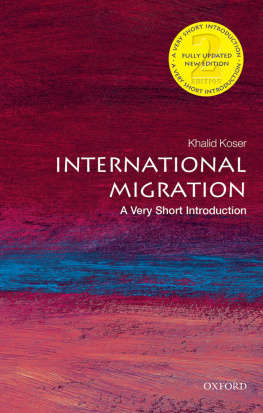Acknowledgments
T his book has been written during our time at the James Martin 21st Century School at the University of Oxford. The School has provided an extraordinary, rich intellectual home, and engagement with our colleagues from across the University has provided a wonderfully vibrant environment in which to think. We have been most fortunate to be able to draw on the Oxford Martin School's International Migration Institute and its successive directors, Professors Stephen Castles and Robin Cohen, who have been tremendously generous intellectually and in offering up their precious time to comment on the entire manuscript. In writing this book, our colleagues at the Oxford Martin School, and particularly Laura Lauer and Verity Ross-Smith, have cheerfully accommodated challenging schedules and created a vibrant environment in which to work.
We have been fortunate to be able to rely on the work of a number of particularly able research assistants. Alan Gamlen provided an incisive fresh look at the structure and content of this book, and his contributions remain evident in the organization and a number of elements of the book. Ted Maxwell and Emma Menell provided help with particular sections, working on the historical chapters and the legal and regulatory environment, respectively. We have Wolfgang Lutz to thank for his expert comments on . Tom King created several of the book's illustrations on very short notice. Others who have lent their time and ideas include Alessio Cangiano, Peter Healey, Miles Hewstone, Jaco Hoffman, Judith McNeill, Kathleen Newland, Michael Oppenheimer, Bob Sutcliffe, Darshan Vigneswaran, and two anonymous referees. Princeton University Press has been an ideal publishing partner. Richard Baggaley from our first discussions provided enthusiastic guidance. We are grateful for the tremendous support of Peter Dougherty and all of his colleagues at Princeton for shepherding the book through its final phases of editing and publication.
(IG) This book has evolved over five years and has its gestation in a lifelong interest in migration that was forged out of my own, my parents', and my grandparents' escape from oppressive regimes and productive settlement in new lands. Francis Wilson first helped me translate this fascination into economic analysis while I was completing my undergraduate studies. Decades later, at the World Bank, I was fortunate to work with Nick Stern and to enjoy his support as I sought to develop a program on migration and development. Jim Wolfensohn allowed me to pursue this interest while vice president, and with excellent research assistance from Andrew Beath, I was able to develop a framework for migration that first appeared as a chapter in the book Globalization for Development, which I coauthored with Kenneth Reinert. Finally, this book would not have been possible without the contributions of my research assistants. Meera Balarajan provided a wealth of foundation materials that were invaluable building blocks for this book, reflecting her broad knowledge and dedication to migration research. Geoffrey Cameron subsequently developed these and an amazing amount of other materials. With a writing style that I was delighted to mesh with my own, he has proven himself a most engaging and effective collaborator, without whom this book would not have been completed.
I am deeply grateful to a number of colleagues at Oxford University, not least Laura Lauer, and to Peter Dougherty at Princeton University Press for their remarkable professionalism and support through the challenging birth pains of this book.
My biggest debts are to my family, who endured what must have seemed like endless nights and weekends when I have been preoccupied with the book.
(GC) I have my parents to thank for an enriched childhood growing up in three countries, movement that was born out of their desire to see the world's diversity with open eyes. As I grew up studying Baha'i texts, these experiences helped to prompt deep reflection about the future of world development. I thank Laura Lauer and Ian Goldin for bringing me into the School, where thinking about the future is a vocation for its vibrant research team. Ian was not only a stimulating and encouraging collaborator on this book, he also constantly reminded me of our ethical obligations to humanityespecially those who appear to be different from us. I thank him for that, most of all.
I owe my deepest gratitude to my wife, Lita, for entertaining so many conversations about the research and thinking that went into this book. I also have her to thank for giving us a reason to stay in Oxford long enough to advance this project.
While this book was completed after I took a position with Foreign Affairs and International Trade Canada, the views expressed do not necessarily reflect those of the Government of Canada.
(MB) My contribution to this book was written during my time with the James Martin 21st Century School. It was a privilege to be at the School at its inception, and exciting to work with Ian at this creative time. My contribution would not have been possible without the help of my colleagues at the Centre on Migration, Policy and Society (COMPAS) in Oxford, and especially the support of Professor Steve Vertovec and Dr. Nick Van Hear. Also, I wish to thank several scholars and friends all round the world who have shaped my academic development in migration studies, especially Dr. Frank Pieke and Dr. Rachel Murphy.
Finally, I am greatly indebted to my parents who themselves are exceptional peoplemigrants, who experienced many challenges and created a wonderful and supportive platform for me, and my family.
Ian Goldin, Oxford (UK); Geoffrey Cameron, Ottawa (Canada);
Meera Balarajan, London (UK)
December 2010

Migration from Prehistory to Columbus
W e begin the story of human migration where our collective history beganin Africa, the cradle of humanity. Migrants have propelled the advancement of human communities since these early days, some 150,000 to 200,000 years ago. Our biological evolution culminated in the homo sapiens species, whose capacity for language and propensity for trading accelerated a new stage of social evolution that allowed humans to displace other hominids and eventually to develop advanced civilizations. The human gift for cooperation and collective learning made our ancestors particularly adaptive to new environments, and incremental migration gradually populated the earth with human settlements. People continued to move. Merchants, soldiers, adventurers, and religious teachers carried new ideas and technologies between human settlements and civilizations, creating dynamic patterns of growth.
Early in human history, a pattern of cross-community migration appeared. Groups of people would move to new regions, leading to differentiation between the old and newly established communities: subtle variance in language, technology, and beliefs would develop among these groups. Concurrent with this process of differentiation, however, was that of interaction. The diverse ways of doing things were shared across communities by migrant brides, traders, farmers, and herders. Differentiation between communities and regular interaction among them is a historical pattern that continues to this day. Migrants have driven forward the development of society and civilization by serving as conduits for the transmission of new ideas, accelerating learning and innovation.
The history of human communities and world development highlights the extent to which migration has been an engine of social progress. By viewing our collective past through the lens of migration, we can appreciate how the movement of people across cultural frontiers has brought about the globalized and integrated world that we inhabit today. We refer to globalization not only in economic terms, but also in relation to social and political transformations and the emergence of global currents of thought. Of course, migrants are rarely the bright-eyed entrepreneurs that this narrative may unintentionally imply, and migration has often been driven by conflict, exploitation, and poverty. More often than not, people have moved out of necessity and under arduous conditions. Human suffering has accompanied migration; nevertheless, societies have been enriched by the dynamism of migration. As people have moved, they have encountered new environments and cultures that compel them to adapt and innovate novel ways of doing things. The development of belief systems and technologies, and the spread of crops and production methods, have often arisen out of the experiences of, or encounters with, migrants.
Next page
